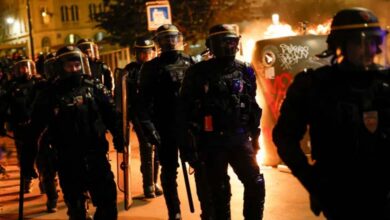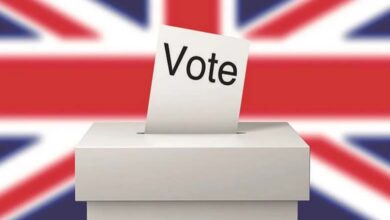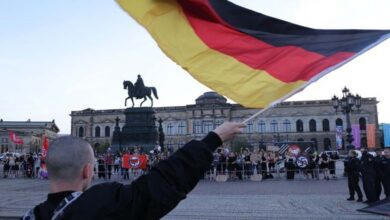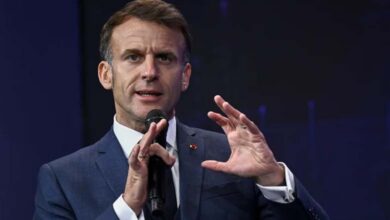“Nail Protests”… France Racing Against Time to Control the Streets
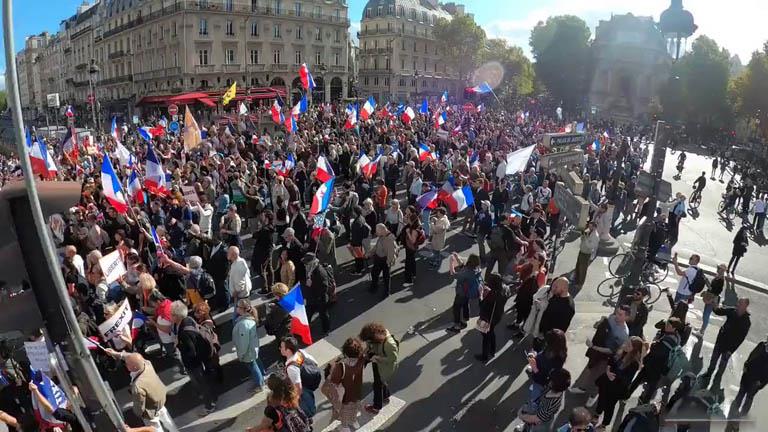
The protests in French cities have not stopped following the killing of a young man of Algerian origins, while the government intends to take measures to quickly control the streets.
This comes after acts of violence and riots witnessed in French cities in protest against the killing of the young boy, Nael Al-Marzouqi (17 years old), by police gunfire on June 27th.
Around two thousand people gathered in Paris on Saturday to protest police violence, despite the ban, while the French government announced its intention to control the streets after days of violence and riots in French cities not seen in the country for twenty years.
Saturday witnessed the organization of around 30 other demonstrations against police violence in French cities, including Marseille (southeast), Nantes (west), Strasbourg (east), and Bordeaux (southwest).
Approximately 5,900 people participated in the protests on Saturday, according to the French Ministry of the Interior.
In parallel with these demonstrations, French Prime Minister Élisabeth Borne pledged on Saturday, in statements to the newspaper “Le Parisien,” to deploy “intensive means to protect the French” on the upcoming National Day, which falls on July 14th.
To prevent a resurgence of violence in the coming weekend, the French government banned the sale of fireworks to individuals, as they were used by rioters at times against law enforcement.
After the riots that followed the killing of the 17-year-old boy, Nael, by a police officer during a traffic stop, President Emmanuel Macron stated that the restoration of “sustainable order” is an absolute priority.
The killing of the young boy last month sparked a wave of violence that lasted for five nights in French cities and was unprecedented since 2005.
According to the French Prime Minister, she may impose penalties on the families of young men involved in acts of violence.
During the Saturday march in Paris, the protesters peacefully gathered in the “Place de la République” in the heart of the capital to commemorate the memory of Adama Traoré, the young man who died shortly after being arrested by the police in July 2016.
The police had announced yesterday the ban on an “undeclared gathering that entails risks of disrupting public order,” citing difficulties in ensuring security due to a shortage of law enforcement personnel after their mobilization to confront the riots.
Assa Traoré, the sister of Adama, who has become a symbol of the fight against police violence in France, delivered a speech in front of several deputies from the “La France Insoumise” party (radical left), surrounded by security forces.
She said, “We march for the youth, to denounce police violence. They want to hide our killings. France is not in a position to give moral lessons. Its police force is racist, its police force is violent.”
The recent acts of violence have shed light on the problems facing French society, from the deterioration of conditions in suburban neighborhoods to the deteriorating relations between youth and security forces.
Ghaniaf Manka, a retiree who was protesting in Strasbourg, told France Presse, “Enough with the blows of rifle butts and rubber bullets (used to disperse protesters). We need a local police force.”
Around 100 associations, unions, and political parties from the left have called on citizens to demonstrate to express “mourning and anger” and to denounce policies that they consider discriminatory against disadvantaged neighborhoods, calling for “a deep reform of the police.”
Meanwhile, the government condemned these calls to protest “in major cities that have not yet recovered from acts of destruction.”
On another note, the French Ministry of Foreign Affairs objected to statements made by a group of UN experts strongly criticizing the way security forces deal with acts of violence and calling for a “ban on racial profiling.”
The ministry considered the statements to be “exaggerated and unfounded,” affirming the intensification of the fight against abuses related to identity-based checks, which it described as “being based on appearances”.



